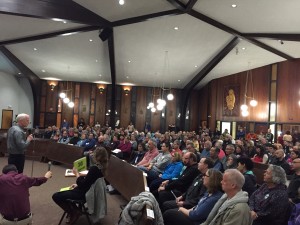
More than 400 people gathered in Anchorage Monday night to discuss the area’s lack of detox facilities. At least 60 people per day try to access the area’s 14 detox beds, and the municipal government and the state’s Board of Nursing are considering some solutions.
Cleansing your body of massive amounts of alcohol or drugs without help is painful, scary, and dangerous, and not just for the person who needs the detox. It impacts the people around them, too. Those were the messages shared by community members during the town hall meeting led by Anchorage Faith & Action- Congregations Together, or AFACT.
Theresa Browning of Anchorage told a story about her son. Eight years ago, he was sent home from the emergency room still drunk because they couldn’t get him a detox bed. That night, he started hallucinating.
“Then he came running into our room, turned the light on, and said ‘Where did those kids go? They’re hiding in your closet,'” she recalled. But there weren’t any kids in the house. “That was scary. So I got up, and went out with him and I told him, ‘Go to bed. There’s nothing here.’ It was scary. So I had to stay up the rest of the night to make sure he doesn’t do anything.”
Browning wants solutions, and Anchorage Mayor Ethan Berkowitz says one is in the works. The municipality has a grant from the legislature for $5 million plan and design an expansion of the Salvation Army’s Clitheroe Center to add detox beds. He says his administration is trying to change the wording of the legislation to allow some of the money to go toward construction, and they are trying to partner with other non-profits and businesses to build the facilities.
“I want to move things quickly. I’m in a hurry. Everyday we wait is a delay where people are in jeopardy. If we work hard and push hard, we can get construction going or at least start turning dirt over the summer.”
But Clithroe Program Director Sherry McWhorter said it’s not that simple. Even if you build a facility, where does the money come from to run it? She estimated that it would cost about $450 per person per day to add detox beds because they would have to hire medical staff, and the program is already underfunded.
“If we were ever to expand more beds, we’d benefit from more room, but there needs to operating money to come along with that,” she said. “So I don’t know how it would all shake out at this point.”
Another factor is staffing. Clithroe doesn’t have any detox beds right now, but McWhorter said they used to have about 10. Then in 2012, medical staffing rules changed. The state’s Board of Nursing interpreted regulations to say that only registered nurses (RNs) could complete an intake assessment for people seeking detox. A licensed practical nurse could not. McWhorter, who was not with Clitheroe at the time, said the facility couldn’t afford to hire the more expensive staff.
“We could not get enough RNs because our funding would not cover enough RNs. But there’s also the problem of just plain manpower shortage. There just weren’t enough RNs to hire out there. And when you’re trying to pay less than the market rate because that’s all you can afford, you just can’t get anybody.”
This is also the reason some of the 14 beds at the Ernie Turner Center sit empty. Under current regulations, if an RN isn’t working, then a patient can’t be admitted.
The Board of Nursing will discuss this regulation during their March 9th meeting. Until then, board members cannot comment on the issue.
AFACT will convene a task force in the next two weeks to help different organizations coordinate and work on solutions. It will include representatives from the municipality, the state’s Division of Behavioral Health, and service providers.
Anne Hillman is the healthy communities editor at Alaska Public Media and a host of Hometown, Alaska. Reach her at ahillman@alaskapublic.org. Read more about Anne here.





